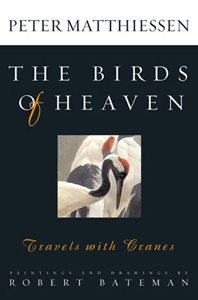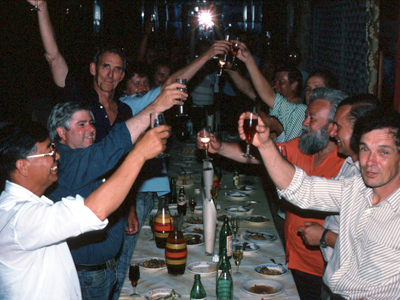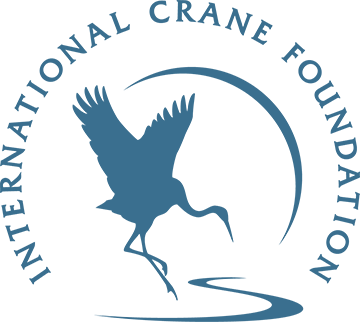By Jim Harris, ICF Senior Vice President
 With sorrow and gratitude, we say our goodbyes for the most eloquent of voices for the cranes. Peter Matthiessen – naturalist, explorer, spokesman for those with little voice, and remarkable writer – died of leukemia on April 5, 2014 at his home on New York’s Long Island. The publication in 2001 of his book The Birds of Heaven: Travels with Cranes, together with a national speaking tour in concert with ICF, brought our organization and the crane cause to a new level.
With sorrow and gratitude, we say our goodbyes for the most eloquent of voices for the cranes. Peter Matthiessen – naturalist, explorer, spokesman for those with little voice, and remarkable writer – died of leukemia on April 5, 2014 at his home on New York’s Long Island. The publication in 2001 of his book The Birds of Heaven: Travels with Cranes, together with a national speaking tour in concert with ICF, brought our organization and the crane cause to a new level.
Peter first joined with ICF in 1992, for an international crane workshop held on a river boat that carried delegates from six countries on a voyage up the Amur River that forms the border between Russia and China. The conversations were not always harmonious, as Peter described in ironic detail. There he met Red-crowned Cranes. Cranes captivated Peter. The book that followed took nine years and transported readers new to cranes into puzzles of ancient taxonomy, contemporary international relations, and the lives and perilous future of these tallest of flying birds.
Immediately after the Amur voyage, Peter joined me for a two-week pursuit of White-naped and Demoiselle Cranes across the steppes of northeast Mongolia, homeland of Genghis Khan, a landscape little changed. The Demoiselle Crane chicks hid in grasses where we easily caught and banded them. The tall White-naped chicks ran much faster, slipped through tunnels of water plants, and dropped from sight. Peter, perched on a hill while the rest of us scattered in confusion, would spot that vanishing point. Our multi-lingual team – Mongolian, Russian, Japanese, Chinese and English – all understood his hand signals that led us to the chicks. Peter was far more than a witness to the cranes and craniacs. His book is a significant contribution to crane literature and thought.
In 1992 and again today, ICF is helping Mongolian colleagues band White-naped Cranes so that we can trace their movements across China and through winter at Poyang Lake (read more about this project in the May 2014 issue of The ICF Bugle). The winter following our travels in Mongolia brought Peter to Poyang to find “our” White-napeds and the Siberian Cranes – but severe drought very like this past winter threatened failure, as he described with wry humor and the pained suspense only possible from a man with the intensity to follow all 15 cranes across their five continents (despite lack of water that February, he found all four crane species that winter beside this largest freshwater lake in China).
 Yet I am most moved by Peter’s evocation of the spirit of cranes, that has drawn humans for as long as there have been humans to see and hear. That transcendence of self and the morning sky has been the gift from cranes to all of us, a gift deepened by the words of Peter Matthiessen. The cranes are the greatest of flying birds and, to my mind, the most stirring, not less so because the horn notes of their voices, like clarion calls out of the farthest skies, summon our attention to our own swift passage on this precious earth.
Yet I am most moved by Peter’s evocation of the spirit of cranes, that has drawn humans for as long as there have been humans to see and hear. That transcendence of self and the morning sky has been the gift from cranes to all of us, a gift deepened by the words of Peter Matthiessen. The cranes are the greatest of flying birds and, to my mind, the most stirring, not less so because the horn notes of their voices, like clarion calls out of the farthest skies, summon our attention to our own swift passage on this precious earth.
Photo: Following the workshop on the Amur in 1992, Chinese, Russians and Americans met at Lake Khanka on the border between Russia and China. Here, Peter (left, third from front) and ICF colleagues toast the proposed international nature reserve at Khanka, which was designated not long after.
